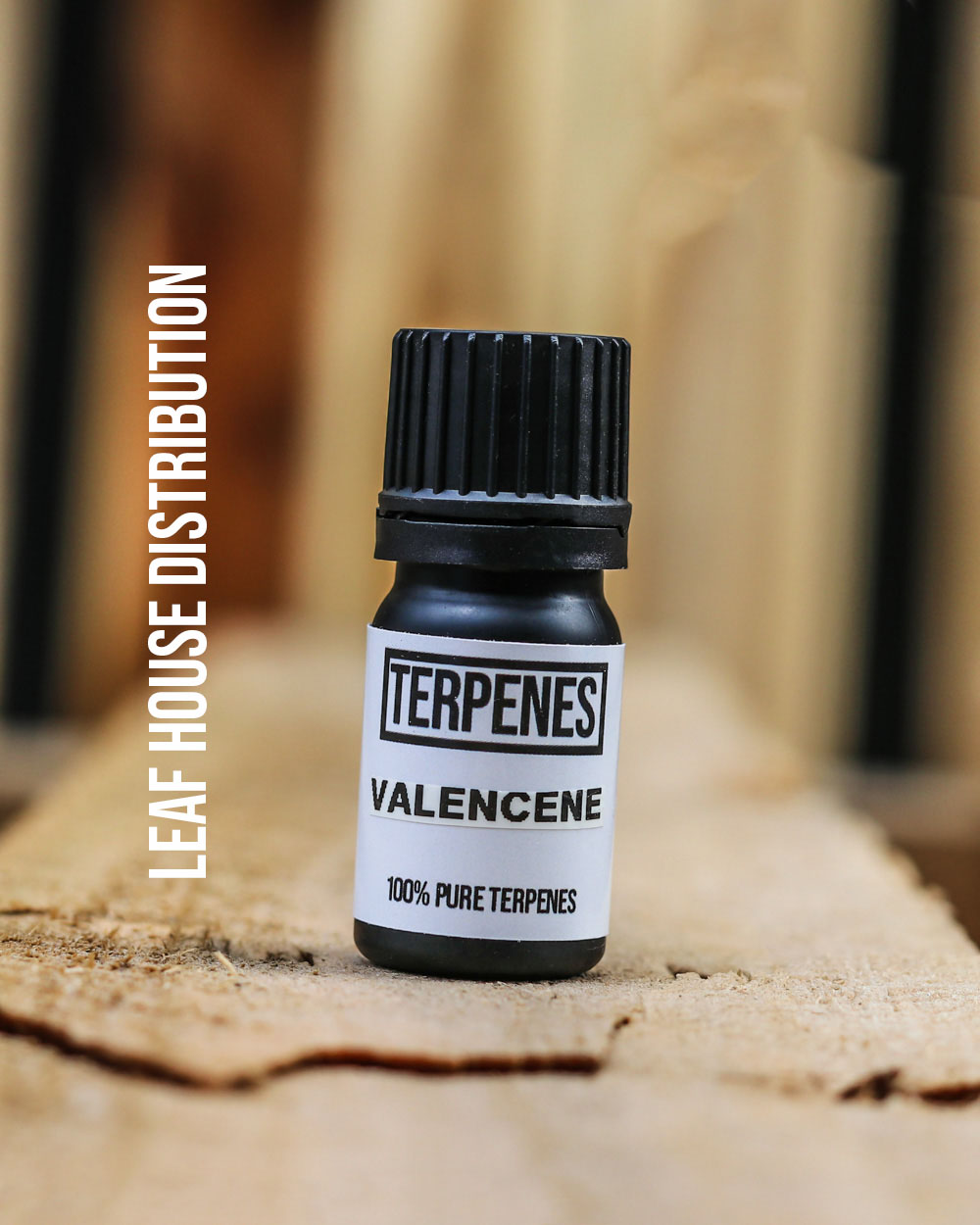VALENCENE – TERPENE ISOLATE – 5ML
Valencene is a sesquiterpene known for its vibrant citrus aroma, often associated with oranges. This pale yellow to yellow liquid terpene is not only cherished for its fragrance but also for its versatility in various applications, from personal care products to food and beverages.
CUSTOMERS WHO VIEWED VALENCENE ALSO VIEWED
PROPERTIES: VALENCENE
| COLOUR: | Pale Yellow to Yellow |
| CONSISTENCY: | Liquid |
| ODOUR: | Citrus |
| BOILING POINT: | 274ºC |
| FLASHPOINT: | >93ºC |
| SOLUBILITY: | In Water, 0.05011 mg/L at 25ºC |
| FORMULA: | C15H24 |
| DENSITY: | 0.92 g/mL at 25ºC |
| MOLECULAR WEIGHT: | 204.357 g/mol |
WHERE DOES VALENCENE COME FROM?
Valencene is naturally found in a variety of citrus fruits, such as oranges, tangerines, and grapefruits, as well as in certain herbs and tree bark. This terpene derives its name from the Valencia orange, where it is most abundantly present. Valencene is also a precursor to nootkatone, a compound responsible for the aroma of grapefruit and is widely used in flavouring and fragrance applications. Plants that contain Valencene include:
01
ORANGES
02
TANGERINES
03
GRAPEFRUITS
04
HERBS
05
TREE BARK
WANT TO KNOW MORE ABOUT VALENCENE?
Download the Certificate of Analysis (COA) to get more detailed information about the ACDC Blend.
Learn the difference between Terpenes Isolates, Blends and Diluents.
APPLICATIONS OF VALENCENE
Valencene is widely used in bath products, beauty supplies, and cleaning products due to its fresh, citrus scent. Additionally, it serves as an effective insect repellent, being particularly potent against mosquitoes and ticks. Valencene is also utilised as a flavouring agent in food and beverages, adding a bright, citrusy note to various products.
GUIDANCE ON USING TERPENE ISOLATE
When using terpene isolates like valencene, the method and quantity added to various formulations are highly individualised. Due to the concentrated nature of pure terpenes, it is recommended to conduct thorough research before incorporating them into your mixtures or products.
WHAT’S THE VALENCENE MOLECULE LOOK LIKE?
WHAT ARE TERPENES USED FOR?
Terpenes are versatile compounds widely used in various industries due to their aromatic qualities. They are key components in aromatherapy, essential in creating complex scents for fragrance and flavors, and are commonly used in cleaning products for their natural properties. Terpenes also enhance personal care products and serve as natural alternatives in insect repellents and agricultural applications as natural pesticides.
AROMATHERAPY
Terpenes are key components in essential oils, which are widely used in aromatherapy. They contribute to the distinctive scents and potential therapeutic effects of these oils. For example, linalool, commonly found in lavender, is often used to promote relaxation and reduce stress.
FRAGRANCE AND FLAVOURS
In the fragrance industry, terpenes are essential for creating complex and appealing scents in perfumes and colognes. Terpenes like limonene, which has a citrusy aroma, are popular for adding fresh and uplifting notes. Additionally, terpenes are used as natural flavourings in food and beverages, enhancing products with citrus, herbal, or fruity flavours.
CLEANING PRODUCTS
Terpenes such as limonene are frequently included in natural cleaning products. They provide a pleasant scent while also offering natural grease-cutting abilities, making them effective in eco-friendly cleaning solutions.
PERSONAL CARE PRODUCTS
Many skincare and personal care products incorporate terpenes for their aromatic properties and potential skin benefits. For instance, linalool is often added to lotions and creams for its soothing fragrance and possible calming effects on the skin.
INSECT REPELLENTS
Some terpenes, like citronellol and valencene, are utilised in natural insect repellents due to their ability to repel mosquitoes and other pests. These terpenes are valued for providing a safer, chemical-free alternative to synthetic repellents.
AGRICULTURAL APPLICATIONS
In agriculture, terpenes are sometimes used as natural pesticides to deter insects and other pests. Terpenes like beta-caryophyllene are known for their insect-repellent properties, making them a valuable tool in sustainable farming practices.
















Reviews
There are no reviews yet.